Adrienne Clarkson facts for kids
Quick facts for kids
Adrienne Clarkson
PC CC CMM COM CD FRSC(hon) FRAIC(hon) FRCPSC(hon)
|
|
|---|---|
| 伍冰枝 | |
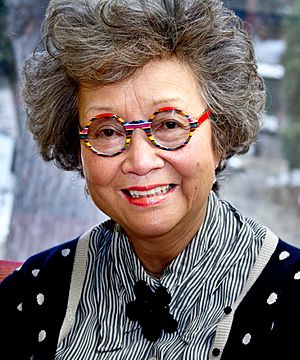
Clarkson in 2011
|
|
| 26th Governor General of Canada | |
| In office October 7, 1999 – September 27, 2005 |
|
| Monarch | Elizabeth II |
| Prime Minister | |
| Preceded by | Roméo LeBlanc |
| Succeeded by | Michaëlle Jean |
| Personal details | |
| Born |
Adrienne Louise Poy
February 10, 1939 Victoria, Hong Kong |
| Spouses |
|
| Children | 3 |
| Parent |
|
| Alma mater |
|
| Profession | Journalist |
| Chinese name | |
| Chinese | 伍冰枝 |
| Hanyu Pinyin | Wǔ Bīngzhī |
| Jyutping | Ng5 Bing1-zi1 |
Adrienne Louise Clarkson (Chinese: 伍冰枝; born February 10, 1939) is a Canadian journalist and stateswoman. She served as the 26th governor general of Canada from 1999 to 2005.
Clarkson came to Canada with her family in 1941. They were refugees from Japanese-occupied Hong Kong. She grew up in Ottawa. After getting several university degrees, Clarkson worked as a producer and broadcaster for the Canadian Broadcasting Corporation (CBC). She also wrote for different magazines.
In the early 1980s, she worked as a diplomat, promoting Ontarian culture in France and other European countries. In 1999, Queen Elizabeth II appointed her as Governor General. This was suggested by Prime Minister of Canada Jean Chrétien. She took over from Roméo LeBlanc and served until 2005, when Michaëlle Jean became Governor General. While her appointment was first welcomed, some people had concerns during her time as the Queen's representative. This was mainly about the costs of her office.
After her term, on October 3, 2005, Clarkson joined the Queen's Privy Council for Canada. She later wrote her memoirs, started the Institute for Canadian Citizenship, and became Colonel-in-Chief of Princess Patricia's Canadian Light Infantry.
Contents
Early Life and Education
Adrienne Clarkson is a Chinese Canadian. Her family comes from the Taishanese and Hakka groups in Guangdong, China. Her grandfather moved to Australia in the late 1800s. Her father, William Poy, was born in Australia but later went to Hong Kong. There, he worked for the Canadian government. He met and married Ethel Poy, and they had two children: Neville Poy and Adrienne. Neville later became a plastic surgeon in Toronto.
Clarkson remembers hiding in basements in Hong Kong during the Japanese invasion in 1941. Her father's connections with the Canadian government helped their family escape to Canada in 1942. They were part of a group of Canadian government staff leaving the city. The family settled in Ottawa. Clarkson went to public school there. In 1951, she saw Princess Elizabeth (who later became Queen Elizabeth II) as her motorcade passed through the city.
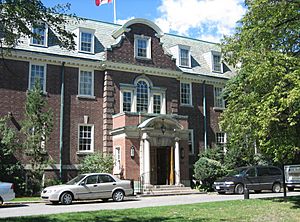
Clarkson finished high school in 1956. She then went to Trinity College at the University of Toronto. She won an award for her English studies and graduated in 1960 with a Bachelor of Arts degree. She then traveled to East and Southeast Asia with her parents. Clarkson continued her studies at the University of Toronto, earning a master's degree in English literature. In 1962, she began advanced studies at the Sorbonne in Paris, France.
A Career in Journalism
In 1965, Clarkson started working for the Canadian Broadcasting Corporation (CBC) as a freelance book reviewer for a show called Take 30. This was the beginning of her almost 30-year career with the CBC. She quickly became a co-host, making her one of the first people from a visible minority to have a major role on Canadian television. She stayed with Take 30 for ten years. During this time, she also wrote for magazines like Maclean's and Chatelaine. She also wrote her own novels, A Lover More Condoling and Hunger Trace. In 1971, her non-fiction book True to You in My Fashion: A Woman Talks to Men About Marriage was published.
In 1974, Clarkson hosted her own TV show, Adrienne at Large, which included travel to places like South Africa and her home, Hong Kong. In 1975, the CBC created The Fifth Estate, a show focused on serious journalism. Clarkson was a co-host and became known for her investigative journalism.
Clarkson left The Fifth Estate in 1983. She was then appointed as the Agent General for Ontario in France. In this role, she helped connect Ontario's culture with France and other European countries. After five years, she returned to private business, becoming president and publisher of McClelland and Stewart, a publishing company.
Clarkson later returned to television, hosting Adrienne Clarkson Summer Festival in 1988. This show became popular and was renamed Adrienne Clarkson Presents. It was an arts show that received good reviews. After four years, Clarkson was recognized for her long media career and her work with charities. She received many awards for her hosting and producing.
In 1995, Prime Minister of Canada Jean Chrétien appointed Clarkson as chair of the board for the Canadian Museum of Civilization and later the Canadian War Museum. She continued to host her show during this time. She also helped with the decision to build the new Canadian War Museum, which she opened as Governor General in 2005.
Serving as Governor General of Canada
Adrienne Clarkson was the first visible minority and refugee to be appointed Governor General. She was also the second woman (after Jeanne Sauvé), the first Chinese Canadian, and the first person without a military or political background to hold the role. She brought a new approach to the position, focusing on bringing national attention to Northern Canada.
Becoming Governor General
On September 8, 1999, it was announced that Queen Elizabeth II had approved Prime Minister Jean Chrétien's choice of Clarkson to be her representative. The official document appointing Clarkson was issued on September 28. It was also known that Clarkson would be joined at Rideau Hall by her partner, John Ralston Saul.
In Office
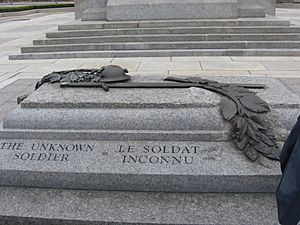
On October 8, 1999, Clarkson was sworn in as the 26th Governor General of Canada. She quickly became involved in her duties. She played a key role in bringing Canada's unknown soldier home from France. Her speech at the tomb's dedication ceremony on May 28, 2000, was described as "powerful." She also worked to have Princess Patricia's Canadian Light Infantry honored, starting a strong connection between her and the military regiment.
After the terrorist attacks in the United States on September 11, 2001, Clarkson praised Operation Yellow Ribbon, where Canadian communities helped stranded air travelers. On September 14, 2001, she led a memorial service on Parliament Hill for the victims, attended by over 100,000 people. Following advice from her government, Clarkson sent Canadian soldiers to help in the invasion of Afghanistan. As the Queen's representative and commander-in-chief of the Canadian Forces, she visited Canadian troops in Afghanistan in 2002. She also visited troops in Kosovo and the Persian Gulf. These trips earned her praise for taking her role as commander-in-chief seriously, which helped boost pride in the Canadian Forces.
Clarkson worked to increase the importance of the Governor General's office. She traveled widely, hosted important events, and organized conferences. However, there was some criticism about the spending of her office. The costs at Rideau Hall increased during her time. Part of this was due to how costs were accounted for, but the media focused on her 2003 trip to northern countries like Russia, Finland, and Iceland. This trip, which included 50 other Canadians, cost a lot of money. Some politicians questioned the role of the Governor General because of these costs. Clarkson personally addressed the concerns, explaining that the trips were requested by the Prime Minister.
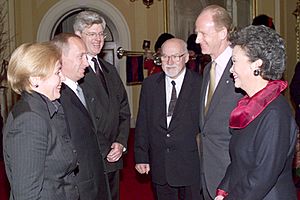
Her office faced close attention after this. In November 2004, her budget was cut. In March 2005, she again faced questions about spending for official visits to Spain, the Netherlands, and Russia. After her term ended, Clarkson publicly stated that the government had not defended her office and that her state trips were requested by the Department of Foreign Affairs.
Clarkson's way of carrying out her duties also led to some discussions. For example, at a ceremony for Canada's involvement in Juno Beach during D-Day, there was confusion about who should have the highest rank. Her office initially stated she would attend as Canada's head of state, which was later corrected. At Remembrance Day ceremonies, she changed the tradition of placing the first wreath. These actions sometimes caused debate among those who follow royal traditions closely.
Extended Time in Office
Despite the discussions, Clarkson was asked to stay in her role for an extra year beyond the usual five-year term. Prime Minister Martin advised the Queen to keep her to provide stability during a time when the country faced potential political challenges.
In July 2005, Clarkson had a pacemaker implanted but recovered quickly and returned to her duties. To celebrate the 50th anniversary of the first Canadian-born governor general, Clarkson held Order of Canada ceremonies in different places across the country. On July 23, 2005, she was made an honorary member of the Kainai Chieftainship in Alberta, receiving the name Grandmother of Many Nations. On September 15, 2005, she announced the creation of the Governor General's Northern Medal, an award for people who help the Canadian North.
In her last days in office, the military held a large farewell ceremony for her. On September 26, 2005, Members of Parliament thanked her for her work. The next day, her time as Governor General ended when Michaëlle Jean was sworn in. Clarkson attended Jean's ceremony, which was unusual but done with Jean's agreement.
Her Impact
Clarkson was seen as bringing new energy to the role of Governor General. Michaëlle Jean said Clarkson "infused the office with a new energy" and promoted Canadian artists and Indigenous communities. Clarkson was also praised for her dedication to the armed forces and remembrance. She and her husband traveled across Canada and met more Canadians than any other Governor General. Clarkson often wrote her own speeches, which were known for being smart and easy to understand. She also supported the arts and sports, creating the Clarkson Cup for women's hockey in Canada in 2005.
However, some people felt that her increased international travel drew negative attention due to costs. There was also some confusion about whether the Governor General was Canada's head of state, which is actually the monarch.
Life After Being Governor General
After leaving Rideau Hall, Clarkson and Saul bought a home in Toronto. She also signed a deal to publish her memoirs in two books. The first, Heart Matters, came out in September 2006. In the book, she shared her childhood, her CBC career, and her time as Governor General.
In an interview in October 2006, Clarkson shared her thoughts on the Governor General's role. She believed the Governor General was the direct representative of "the Crown" and Canada's actual head of state, a view that differs from many others. She continued to promote this idea, suggesting that candidates for Governor General should be reviewed by a parliamentary committee and even take a televised quiz.
On February 7, 2007, the Queen appointed Clarkson as Colonel-in-Chief of Princess Patricia's Canadian Light Infantry. She said she was "deeply honoured" to accept this role. The ceremony took place on March 17 in Edmonton. Clarkson is also involved with a dance company and presented the Massey Lectures in 2014, speaking on the topic of "Belonging: The Paradox of Citizenship."
Personal Life
Since the 1980s, Clarkson has been in a relationship with Canadian writer and philosopher John Ralston Saul. In 1963, Clarkson married Stephen Clarkson, a political science professor. They had three daughters: Kyra, born in 1969, and twins Blaise and Chloe, born in 1971. Sadly, Chloe died at nine months old. Adrienne and Stephen divorced four years later.
Clarkson is a devoted Anglican, and her family has been Anglican for many generations. She chose to attend Trinity College at the University of Toronto because of its Anglican connections. She was friends with Michael Peers, who later became an archbishop. Peers officiated at her marriage to Saul and at her installation as Governor General. Clarkson is also credited with bringing prayer back to the Governor General's installation ceremony.
Clarkson was open about her religious beliefs during her time at Rideau Hall. She spoke about how her Anglican faith was a part of her life. She also visited Anglican churches across Canada during her tours.
Honours and Awards
Key Appointments and Medals
- April 30, 1992: Officer of the Order of Canada (OC)
- October 8, 2000: Chancellor and Principal Companion of the Order of Canada (CC)
- October 8, 2000: Chancellor and Commander of the Order of Military Merit (CMM)
- October 8, 2000: Dame of Justice, Prior, and Chief Officer in Canada of the Most Venerable Order of the Hospital of Saint John of Jerusalem
- October 8, 2000: Chief Scout of Canada
- October 3, 2000: Chancellor and Commander of the Order of Merit of the Police Forces (COM)
- July 23, 2005: Honorary Chief of the Kainai Chieftainship
- October 3, 2005: Member of the Queen's Privy Council for Canada (PC)
- 1960: Governor General's Academic Medal
- 1967: Canadian Centennial Medal
- 1992: Commemorative Medal for the 125th Anniversary of the Confederation of Canada
- October 8, 1999: Canadian Forces' Decoration (CD)
- 2002: Queen Elizabeth II Golden Jubilee Medal
- 2012: Queen Elizabeth II Diamond Jubilee Medal
- March 26, 2019: Gold Medal of the Royal Canadian Geographical Society
Honorary Military Appointments
- October 8, 2000 – September 27, 2005: Colonel of the Governor General's Horse Guards
- October 8, 2000 – September 27, 2005: Colonel of the Governor General's Foot Guards
- October 8, 2000 – September 27, 2005: Colonel of the Canadian Grenadier Guards
- February 7, 2007 –: Colonel-in-Chief of Princess Patricia's Canadian Light Infantry
Honorary Degrees
Clarkson has received many honorary degrees from universities across Canada, including:
- 2000: University of Victoria, Doctor of Laws (LLD)
- 2001: McGill University, Doctor of Laws (LLD)
- 2001: Royal Military College of Canada, Doctor of Laws (LL.D)
- 2001: University of Toronto, Doctor of Laws (LL.D)
- 2003: University of Ottawa, Doctor of the University (DUniv)
- 2003: Queen's University, Doctor of Laws (LLD)
- 2004: Concordia University, Doctor of Laws (LLD)
Fellowships and Memberships
- 1993: The Royal Conservatory of Music Honorary Fellowship
- Senior Fellow of Massey College
- Honorary Fellow of the Royal Architectural Institute of Canada (FRAIC (hon))
- Honorary Fellow of the Royal College of Physicians and Surgeons of Canada (FRCPSC (hon))
- Honorary Fellow of the Royal Society of Canada (FRSC (hon))
- Honorary Fellow of the University of Trinity College
Things Named After Her
- Clarkson Cup (for women's hockey)
- Adrienne Clarkson Laureateship for Public Service, Massey College, Toronto
- Adrienne Clarkson Elementary School, Ottawa
- Adrienne Clarkson Public School, Richmond Hill, Ontario
Coat of Arms
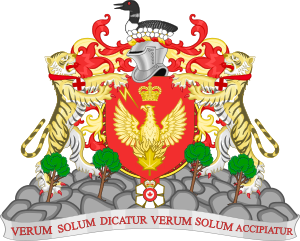 |
The trillium flowers represent Ontario, her home province. Tigers are Clarkson's favorite animals and represent her birth year. The cross and white disc are based on the Anglican Church of Canada's symbol. The rocks and trees show the landscape around her cottage in Georgian Bay. |
See also
 In Spanish: Adrienne Clarkson para niños
In Spanish: Adrienne Clarkson para niños

